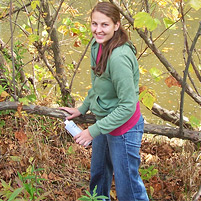The Monongahela

Jessica Wilson
Growing up on Long Island, N.Y., Jessica Wilson became aware of many kinds of water issues.
A persistent desire to study water pollution and its impact on drinking water quality led her to pursue a graduate education at Carnegie Mellon University.
Under Professor Jeanne VanBriesen's expert guidance, Wilson's work will help ensure safe water quality in the Monongahela River.
"I was looking for an environmental engineering program that would let me continue studying emerging environmental issues and Jeanne offered me some really flexible opportunities," Wilson said.
"When I started, she didn't have a set project for me in mind. I had experience in an environmental laboratory and in analytical chemistry, and she simply had the confidence in me that I would do a good job in the lab."
While working on a chemistry-based project studying kinetics of chelating agent reactions [.pdf], an opportunity arose for Wilson to analyze drinking water samples for disinfection by-products.
Soon after, VanBriesen's WaterQUEST initiative received a grant to study water quality in the Monongahela River. Wilson was VanBriesen's go-to researcher.
"Initially, we were targeting source water components of total dissolved solids such as bromide, chloride and sulfate. But now we are looking for impacts of energy-related activities in the region and we are trying to identify whether or not these components we're finding are from the wastewater from oil and gas activities, such as Marcellus Shale produced water, wastewater from coal-fired plants or acid mine drainage."
The team started in September 2009. They now have two full years of bi-weekly data on the source water and drinking water.
Eyebrows raised when they found a spike in bromide concentration in the summer of 2010.
"It's a concern because when bromide enters the drinking water treatment plant it becomes oxidized by the disinfectant and reacts with any organic matter in the water. This results in the formation of disinfection by-products, which are carcinogenic," she explained.
Wilson says when she arrives on campus each day, she feels really lucky.
"I never thought I would end up at a such a great university. I like that the research is very self-guided. If there is something I want to look into, I have the opportunity to look into it," she said.
Wilson holds VanBriesen in high regard.
"She definitely challenges me as a student. She expects a lot and makes me work harder," Wilson said.
"She also gets excited about the work. That rubs off on me, and I get excited as well. It confirms what I learned when I was looking at graduate schools to attend. Jeanne's Ph.D. students told amazing stories about how supportive she was of them, both professionally and personally. Now I'm one of them."
Related Links: WaterQUEST | Civil & Environmental Engineering | Steinbrenner Institute | Environment at Carnegie Mellon
